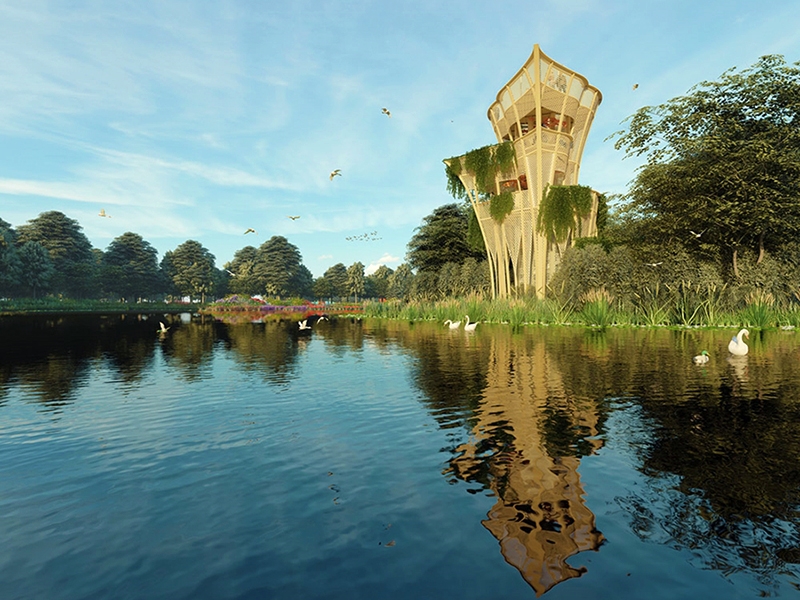
The Framework Plan for a Riverine Commons and Institute for the Watershed Conservation Resource Center has received a citation in the 2023 Progressive Architecture Awards. The plan was developed by the U of A Community Design Center and its partners.
The Framework Plan was one of 10 projects from the United States, Canada, Poland and Uganda recognized — through two awards, five merits and three citations — out of more than 100 submitted projects.
Now in its 70th year, the Progressive Architecture (P/A) Awards recognize unbuilt projects demonstrating overall design excellence and innovation. The P/A Awards are a gauge of design innovation and future trends in architecture and urbanism. Whether through reimagining housing, healthcare facilities or cultural spaces, the honorees reinforce the critical role architects play in making communities more vibrant, according to Architect Magazine. This year's winning projects were published in the March issue.
The U of A Community Design Center, directed by Steve Luoni since 2003, is an outreach center of the Fay Jones School of Architecture and Design. Luoni is also Distinguished Professor of architecture and the Steven L. Anderson Chair in Architecture and Urban Studies at the university. The center's staff also has written a book about watershed urbanism.
"The Framework Plan operates at the intersection of anthropology, ecology and design in developing a lasting and robust riverine knowledge fund across space and time," Luoni said. "We are honored and thrilled that the work has won a P/A award — a much coveted industry award."
The Framework Plan is aimed at transforming a long-neglected corner of Fayetteville. Only minutes from the heart of the city, the site comprises 98 acres of threatened natural wetlands, a key ecological and cultural resource present in the region's past.
"The river institute is an emerging concept in environmental design, and we are fortunate to have had the opportunity to work with visionary ecologists and engineers at the Watershed Conservation Resource Center in conceiving this unique project," Luoni said. "We are doubly fortunate to have this kind of eco-cultural asset in our own backyard. River institutes integrate riparian ecology with culture, heritage and science in an accessible environment that promotes public education and watershed stewardship. Heritage landscapes with outdoor exhibitions will interpret the riparian lifeways of Native American, African American and Euro-American settler populations who foraged and cultivated food and fiber along the region's waterways."
Under the Community Design Center plan, extensive remediation will undo decades of damage from urban encroachment, while new facilities and installations will create a unique interpretive landscape and reveal hidden layers of heritage. An elegant visitors center — including full-size reconstructions of settler and early African American housing types — will showcase the diverse social history of the Ozark waterways.
Elsewhere, winding paths will cut through dense patches of indigenous plants and gardens featuring traditional agriculture, recalling the area as it was before European settlement. A bird blind tower will loom on the water's edge, beckoning visitors onward to a first-hand encounter with Arkansas' winged wildlife.
In the schematic design portion of the work, the collaborators looked at the development of an intercity water trail and a boat livery on the West Fork of the White River flowing through the site. The master plan incorporates a new spur of the nearly 40-mile Razorback Regional Greenway and secondary trails displaying information about Native American land-use practices through the design of outdoor exhibit assemblies.
The plan includes a celebration of food as technology through an array of gardens: the Rice Garden, the Native American Garden, the African American Garden and the Euro-American Garden. The site will also be a haven for plant species native to the Ozarks region, providing locals the opportunity to reimagine how they landscape their own properties.
The awards jury commended the plan's management of the property's natural features.
"It has a strong environmental agenda, but it also includes a lot of public space. You rarely see [that combination] with these restorative projects," Lawrence Scarpa, jury member, said.
Luoni and the Community Design Center staff collaborated on this project with Sandi Formica, co-founder and executive director of the Watershed Conservation Resource Center (WCRC) in Fayetteville, who is an authority on design-build restoration of river, wetland and riparian landscapes; Matthew Van Epps, co-founder and associate director of the WCRC, who specializes in anthropogenic processes affecting watershed resources, river restoration design and implementation, and engineer landscape restoration strategies; and Jami Lockhart, Ph.D., archeologist at the Arkansas Archeological Survey and a prominent author on Arkansas history, who oversees the development of programmatic content on Indigenous and settler lifeways and agricultural practices for exhibit on the trail system.
This project occurred over three years, Luoni said, and a robust group of Fay Jones School students in a fall 2022 design studio was involved in the preparation of the final master plan.
The Community Design Center was awarded a National Endowment for the Arts grant to support the creation of the master plan. The property is co-owned by the Watershed Conservation Resource Center and the city of Fayetteville.
This year's Progressive Architecture Award jury members were Carrie Byles, FAIA, managing partner at SOM in San Francisco and Seattle; DK Osseo-Asare, co-founder and principal at Low Design Office in Austin, Texas, and Tema, Ghana; and Lawrence Scarpa, FAIA, co-founder at Brooks + Scarpa in Hawthorne, California.
Contacts
Tara Ferkel, communications specialist
Fay Jones School of Architecture and Design
479-575-4704, tferkel@uark.edu
Michelle Parks, director of communications
Fay Jones School of Architecture and Design
479-575-4704, mparks17@uark.edu